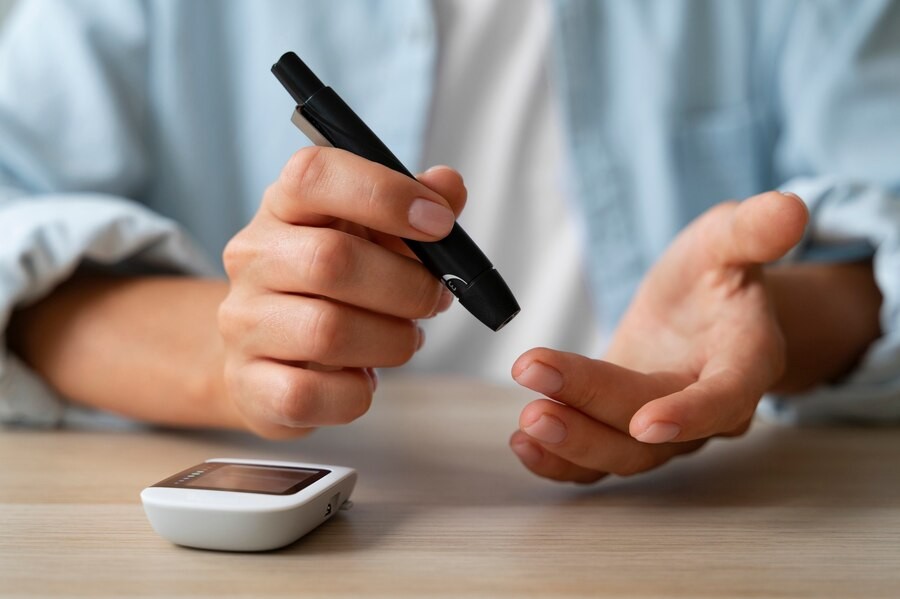Air merupakan kebutuhan dasar yang sangat penting untuk kesehatan tubuh. Disarankan untuk mengonsumsi minimal 7-8 gelas air setiap hari guna memenuhi kebutuhan cairan tubuh.
Minum cukup air tidak hanya membantu proses pencernaan dan metabolisme, tetapi juga berperan penting dalam menjaga keseimbangan kadar gula darah. Pengelolaan kadar gula sangat penting khususnya bagi pengidap diabetes.
Mengapa Minum Cukup Air Dapat Menjaga Kadar Gula Darah Tetap Stabil?
Air adalah komponen utama tubuh manusia, yang diperlukan untuk hampir semua fungsi biologis. Cairan tubuh membantu menjaga keseimbangan suhu, mendukung pencernaan, melancarkan peredaran darah, dan mengeluarkan limbah melalui urine.
Minum cukup air juga dapat membantu menjaga kadar gula darah tetap stabil melalui beberapa cara, di antaranya:
Membantu proses pengeluaran gula berlebih melalui urine
Air membantu tubuh membuang kelebihan gula melalui urine. Jika tubuh mengalami dehidrasi, ginjal akan kesulitan dalam membuang gula berlebih. Akibatnya, gula akan menumpuk di dalam tubuh dan menyebabkan kadar gula darah menjadi tinggi.
Dengan meminum cukup air, ginjal dapat berfungsi lebih efisien dalam mengeluarkan gula melalui urine, sehingga membantu menjaga kadar gula darah tetap stabil.
Mencegah dehidrasi yang memicu kenaikan gula darah
Dehidrasi dapat memicu peningkatan kadar hormon vasopresin yang menginduksi hati untuk menghasilkan lebih banyak gula dalam darah dan mendorong ginjal untuk menahan air. Hal ini bisa berpotensi meningkatkan kadar gula darah.
Minum cukup air dan menjaga tubuh tetap terhidrasi dapat membantu mengontrol produksi vasopresin, sehingga kadar gula darah lebih stabil.
Baca Juga: Gemar Minuman Manis Kekinian, Waspada Penyakit Liver
Membantu fungsi organ secara optimal
Air diperlukan untuk menjalankan berbagai fungsi tubuh, termasuk metabolisme karbohidrat dan lemak. Saat tubuh mendapatkan cukup air, maka semua organ dapat berfungsi lebih baik, termasuk organ-organ yang terlibat dalam pengaturan kadar gula darah, seperti hati dan pankreas.
Hati berfungsi sebagai penyimpan dan pengatur pelepasan glukosa. Ketika kadar gula darah rendah, hati akan melepaskan glukosa yang disimpannya ke dalam aliran darah untuk meningkatkan kadar gula darah.
Sedangkan pankreas, berfungsi menghasilkan hormon insulin dan glukagon, yang keduanya memiliki peran penting dalam mengatur gula darah. Saat kadar gula darah tinggi, pankreas akan melepaskan insulin untuk mengikat glukosa dari darah yang kemudian digunakan sebagai energi.
Meningkatkan sensitivitas insulin
Menjaga tubuh tetap terhidrasi dengan baik artinya membantu proses distribusi insulin dan glukosa ke seluruh tubuh. Penelitian menunjukkan bahwa hidrasi yang baik dapat meningkatkan sensitivitas insulin, sehingga tubuh lebih efisien dalam menggunakan insulin untuk menyerap glukosa dari aliran darah ke dalam sel.
Baca Juga: Minuman yang Berpotensi Merusak Ginjal
Mengurangi rasa lapar berlebih
Kadang-kadang, dehidrasi bisa disalahartikan sebagai rasa lapar. Akibatnya, orang bisa makan lebih banyak dari yang dibutuhkan atau memilih makanan tinggi gula. Dengan minum air yang cukup, risiko salah mengenali antara lapar dan haus bisa dihindari, yang juga membantu mengontrol asupan kalori dan menjaga kadar gula darah tetap stabil.
Memastikan tubuh tetap terhidrasi dengan baik, tidak hanya mendukung fungsi tubuh yang optimal, tetapi juga membantu menjaga kadar gula darah tetap stabil. Biasakan untuk selalu mencukupi kebutuhan cairan tubuh dan hindari minuman manis yang mengandung gula tambahan.
Memiliki pertanyaan lain terkait dengan kadar gula darah? Anda bisa berkonsultasi dengan dokter melalui aplikasi Ai Care yang dapat diunduh di App Store atau Play Store.
Mau tahu tips dan trik kesehatan, pertolongan pertama, dan home remedies lainnya? Cek di sini, ya!
- dr Nadia Opmalina
Arlene Semeco, MS, RD (2024). 14 Easy Ways to Lower Blood Sugar Levels Naturally. Available from: https://www.healthline.com/nutrition/14-ways-to-lower-blood-sugar
Amanda Crowe, MA, MPH. Why You Should Drink More Water. Available from: https://diabetes.org/food-nutrition/eating-healthy/why-drink-more-water
CDC (2024). Manage Blood Sugar. Available from: https://www.cdc.gov/diabetes/treatment/index.html
Cleveland Clinic (2023). Hyperglycemia (High Blood Sugar). Available from: https://my.clevelandclinic.org/health/diseases/9815-hyperglycemia-high-blood-sugar
Valencia Higuera (2024). What to Know About Diabetes and Dehydration. Available from: https://www.healthline.com/health/diabetes/diabetes-and-dehydration












